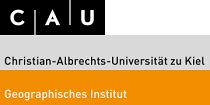Keynotes
Carolin Schurr, Bern, und Peter Weichhart, Wien
From margin to center? Theoretische Aufbrüche in der Geographie seit Kiel 1969
Die Geographie soll so-wohl an gesellschaftlicher Relevanz als auch an theoretischer Tiefe gewinnen – so die Forderungen in Kiel 1969. 50 Jahre nach Kiel ist die Relevanz des Faches unumstritten. Klimastreik, Grenzzäune, Brexit – alle diese aktuellen Ereignisse betreffen Kernthemen der Geographie wie Klimawandel, Migration und Geopolitik.
Aber wer definiert, was gesellschaftlich relevant und damit im Zentrum der Geographie stehen soll? In einem inszenierten Streitgespräch vertreten Carolin Schurr und Peter Weichhart dazu unterschiedliche Positionen: Die Suche nach einem Zentrum des Faches steht dabei der feministisch-postkolonialen Besorgnis über eine solche disziplinäre und disziplinierende Identifikation eines Zentrums gegen-über.
Die Theorieentwicklung des Faches betrachtend, kritisiert Peter Weichhart die zunehmende Zerfaserung und Randständigkeit aktueller Theoriediskussionen. Auf Basis von bell hooks Buch „From Margin to Center“ zeigt jedoch Carolin Schurr, dass Grundkonzepte der Geographie insbesondere von den gesellschaftli-chen und disziplinären Rändern aus hinterfragt und weiterentwickelt wurden. Geographische Zukünfte sehen beide in der Auseinandersetzung mit Fragen der sozialen Gerechtigkeit, wobei das Soziale aus einer posthumanen Dezentrierung heraus gedacht wird.
Moderation: Florian Dünckmann
Andrés Rodríguez-Pose, London
The geography of EU discontent
Over the last decade, parties opposed to EU-integration have almost doubled their votes. The general opinion of the EU has also deteriorated, with a growing share of people who distrust the EU. To understand the high shares of votes for parties opposed to EU integration, this paper focuses on the geography of EU discontent. For the first time, it maps this across more than 63,000 electoral districts in the last national election in each of the 28 EU member states. It assesses whether a range of factors, that are considered to have fostered the surge of populism, have an impact on anti-EU voting in the most recent national election. Research on populism often relies on the individual characteristics of anti-system voters: older, working-class, male voters on low incomes and with few qualifications to cope with the challenges of a modern economy. The results show that economic and industrial decline drive the anti-EU vote. Areas with lower employment rates or with a less educated workforce are also more likely to vote anti-EU. Once these factors have been taken into account, many of the purported causes of the geography of discontent matter much less than expected or their impact varies depending on the strength of opposition to the European project.
Moderation: Robert Hassink
Johann-Bernhard Haversath
50 Jahre nach Kiel ´69 – Schulgeographie und Geographiedidaktik im Sturm der Zeiten
Die gesellschaftlichen Proteste und Umbrüche der 1960er Jahre erreich-ten am Ende des Dezenniums auch die Geogra-phie. Die Auseinandersetzungen in Kiel schlugen hohe Wellen, die Thesen waren provokant, der Ton zwischen den Kontrahenten rau: Für die Schulgeograhie und die Geographiedidaktik „brannte die Hütte“. Fast postwendend wurden deshalb neue Konzepte entwickelt und erprobt, um dem Fach an Schule und Hochschule ein zeitgemäßes Profil zu geben und um die Defizite zu egalisieren. Der Blick in die Disziplin- und Wissenschaftsgeschichte zeigt, dass hierdurch die Weichen nicht automatisch auf Erfolg gestellt wurden. Insgesamt war der Weg im Anschluss an Kiel ´69 steil, steinig und von landesbezogenen sowie nationalen Alleingängen gekennzeichnet. Wurde das Fach besser? Auf jeden Fall konnten die jetzt 50 Jahre alten Vorwürfe überwunden werden, aber in der postmodernen, flüchtigen Welt gibt es keine Garantien, keinen Schonraum – den neuen Konzepten und den aktuellen Bildungsstandards zum Trotz.
Philip Steinberg, Durham
We are all ocean geographers now
The ocean is of increasing importance to global economic and ecological sys-tems, as a space of global commerce, as a site for “blue economic” development, and as an environment for forces of global climate regulation. Amidst these economic and environmental functions, the ocean remains, as well, a crucial space where new modes of territory are developed. Indeed, the ocean has long served as a crucial place for generating global norms and institutions. Nonetheless, it is gaining new relevance today. In a world of anthropogenic change, when stable categories of space are challenged by geophysical change, and of new economic frontiers, where new territo-rial institutions are being developed beyond the limits of land, we all could do well to challenge our research by thinking from and with, as well as about, the ocean.
Moderation: Silja Klepp
Stefan Carsten, Berlin
Zukunftsforschung zur Transformation von Städten und Regionen
Zu- und Abwanderung, Ressourcenverknappung und Klimawandel, Digitalisierung und Individualisierung, Grenzen des Wachstums und gesellschaftliche Sinnkrisen, Flüchtlingsströme, Energiewende und Wohlstandsverteilung sind gegenwärtig diskutierte Herausforderungen, deren Konsequenzen Städte und Regionen oft nur erahnen, aber nicht genau abschätzen können. Was können die Auslöser und Treiber räumlicher Entwicklungen sein und welche gesellschaftlichen Aushandlungsprozesse über den richtigen Umgang mit diesen Herausforderungen führen zu welchen spezifischen Umwelten? Nicht wie, sondern nur dass sich Deutschlands Umwelten über Jahre, ja Jahrzehnte hinaus verändert werden, scheint klar. Dabei braucht es jetzt mehr denn je Spekulationen über die Zukunft und deren mögliche räumliche Konsequenzen. Es braucht methodische Aspekte von Planung und strategischer Vorausschau zum gestaltenden Umgang mit schwachen und manchmal auch starken Signalen. Diese Rahmenbedingungen und Konzepte sind Inhalte des Vortrags genauso wie Beispiele von zukunftsgerichteter Planung und Gestaltung durch raum- und zukunftsprägende Akteure.
Moderation: Jan Kotonski
Hamidreza Sadeghi, Teheran
Current Challenges and Strategies for Soil and Water Resources Management in Developing Countries
Among many different commodities, soil and water as the basic sources stand at the top priority whose management needs more adaptive, precise, sustainable and persistent approaches. However, the soil and water resources management in developing countries with conflicting demands, foolhardily technologies and threatening resources is more complicated. Accordingly, harmony among different aspects of natural and anthropogenic disciplines of the resources at watershed scale is vital to close the ecosystems to a balanced situation. To this end, in the current presentation, it is tried to introduce and discuss different attested and applied approaches viz. land use optimizing, monitoring based watershed management, adaptive watershed management, low impact development, soil-water-energy-food nexus and game theory based co-management of the watershed to hopefully guarantee the cautious utilization of the available resources in a way to restore natural potentials and conserve them for future generations.
Moderation: Rainer Duttmann
Andrea Nightingale, Oslo
The Power of Climate Change: knowledge politics, adaptation follies and ontological frictions
Uncertainty and change in the 21st Century raise uncomfortable questions about who becomes au-thorised to govern and who is required to make changes on the ground with what effects. Yet underlying these politics are power laden assumptions about who has the right knowledge to guide and implement future transformations. In this talk, I show how adapting to climate change is not simply about creating better institutions and infrastructures, but also about navigating difficult knowledge politics. How problems are defined, by whom and with what implications for transformation lie at the heart of action (and inaction) over climate change. Ontological frictions emerge when incompatible worldviews come together within projects intended to foster adaptation, often sabotaging the best designed programs. Drawing from empirical research in Nepal and Kenya I show the potential to reframe approaches to the challenges of climate change when such frictions are the starting point rather than inconvenient barriers to action.
Moderation: Silja Klepp
Monica Stephens, Buffalo
Digital lives and digital lies: geographies of misinformation and incivility
As part of the digital shift in geographic inquiry, scholars have relied on social media and user-generated internet content to identify uneven patterns of information production, public opinion, and community dynamics. However, foreign agents, trolls, spammers and bots have flooded the information stream with false information that is reproduced and debated in traditional news media. Geographers have an essential role in identifying how malicious actors use social media to blur the line between specialists and laypeople. This talk summarizes empirical research into inequalities in media coverage, the rise of hate speech on Twitter, and the vulnerability of American communities to misinformation.
Moderation: Robert Hassink





